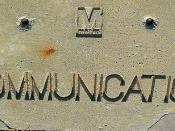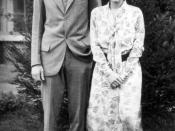Anne Morrow Lindbergh once said, "Good communication is as stimulating as black coffee and just as hard to sleep after." She was exactly right. Communication is the process of sending information through common media such as verbal speech, gestures, body language, and feedback. It is a two part process; first the "speaker" or "sender" transmits the information and then waits for the feedback. The "receiver" or "listener" receives the information and then sends feedback. This process is constantly used by everyone at all times. Communication is vital to the community, society, and the world.
Public speaking is one of the more difficult forms of communication. It is a complex process that can be either beneficial or embarrassing. The exchange of ideas is highly dependent on your perception. Perception is an attitude or understanding based on what is observed or thought. Perception is known as the support beam of communication. It all depends on how you perceive your audience.
It does not always mean a large group of people listening to you. For example, maybe you are talking to someone you like. Because you want their impression of you to be a good one, you may have trouble speaking because you are afraid of embarrassing yourself in front of him or her. Knowing your audience is vital to high-quality public speaking.
Communication can also go through means other than verbal speech. It can be digital, pantomime, and maybe even interpretative dance. Anything that conveys a message involves communication. In any of these forms, the "speaker" must be confident and be organized. Organization is also a vital part of communication. If your ideas don't follow some kind of order, the "receiver" will have a difficult time decoding the information. Any logical order can enhance a speech. Uniqueness is also a fundamental piece...


